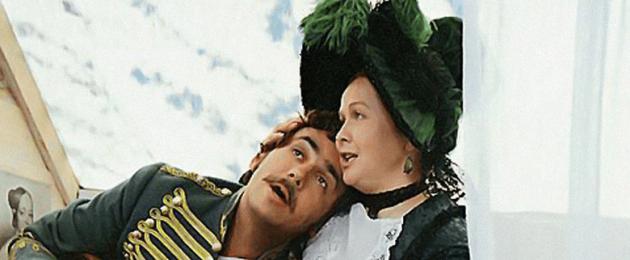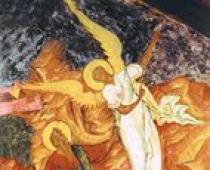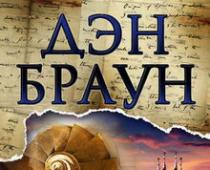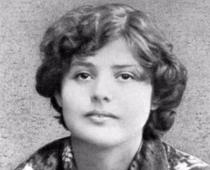Burns Robert (1759-1796)
Scottish poet. Born in the village of Alloway, near the city of Ayr in Scotland, into a poor peasant family. All my life I struggled with extreme poverty. He started writing poetry at the age of 15.
He combined poetic creativity with work on a farm, then with the position of an excise official (from 1789). Satirical poems. "The Two Shepherds" and "The Prayer of Holy Willie" circulated in manuscript and cemented Burns' reputation as a freethinker. The first book, “Poems Written Primarily in the Scottish Dialect,” immediately brought the poet wide fame.
Burns prepared Scottish songs for publication for the Edinburgh edition of The Scottish Musical Museum and A Select Collection of Original Scottish Tunes.
Burns welcomed the Great French Revolution (the poem “The Tree of Liberty”, etc.) and the rise of the revolutionary democratic movement in Scotland and England.
Based on folklore and old Scottish literature, having assimilated the advanced ideas of the Enlightenment, he created poetry that was original and modern in spirit and content.
Burns’s work (“Honest Poverty” and others) affirms the personal dignity of a person, which the poet places above titles and wealth. Poems in praise of work, creativity, fun, freedom, selfless and selfless love and friendship coexist in his poetry with satire, humor, tenderness and sincerity with irony and sarcasm.
Burns's poems are characterized by simplicity of expression, emotionality, and internal drama, which often manifests itself in the composition (“Jolly Beggars”, etc.). Numerous of his songs are set to music and live in oral performance. Burns's poems have been translated into many languages of the world.
Burns died on 21 July 1796 in Dumfries. He was only 37 years old. According to contemporaries, the cause of Burns's early death was excessive alcohol consumption. Historians and biographers of the 20th century are inclined to believe that Burns died from the consequences of hard physical labor in his youth with congenital rheumatic carditis, which in 1796 was aggravated by diphtheria he suffered.
Robert Burns is born January 25, 1759 years in the village of Alloway (Scotland), in the family of the peasant William Burness.
In 1765, his father leased the Mount Oliphant farm, and the boy had to work like adults, enduring hunger and undermining his health.
In 1781, Burns joined the Masonic lodge; Freemasonry had a strong influence on his work.
From 1783, Robert began to compose poetry in the Ayshire dialect.
In 1784, his father died, and after a number of unsuccessful attempts to engage in agriculture, Robert and his brother Gilbert moved to Mossgiel.
Burns's first book was published in 1786. Poems, Chiefly in the Scottish dialect(“The poems are predominantly in the Scottish dialect”). The initial period of creativity also includes: “John Barleycorn” (1782), “The Jolly Beggars” (1785), “The Prayer of Saint Willie,” “Holy Fair” (1786). The poet quickly becomes known throughout Scotland.
In 1787, Burns moved to Edinburgh and became a member of the capital's high society. In Edinburgh, Burns met the popularizer of Scottish folklore, James Johnson, with whom they began publishing the collection “The Scottish Musical Museum.” In this publication, the poet published many Scottish ballads in his own adaptation and his own works.
Published books bring Burns a certain income. He tried to invest the money he earned in renting a farm, but only lost his small capital. The main source of livelihood from 1791 was work as an excise collector in Dumfries.
Robert Burns led a fairly free lifestyle, and he had three illegitimate daughters from casual and short-lived relationships. In 1787, he married his longtime lover Jean Armor. In this marriage he had five children.
In the period 1787-1794, the famous poems “Tam O'Shanter” (1790) and “Honest Poverty” (1795), “Ode Dedicated to the Memory of Mrs. Oswald” (1789) were created. In a poem dedicated to John Anderson (1789), the thirty-year-old author unexpectedly reflects on the decline of life, on death.
In essence, Burns was forced to study poetry in between his main work. He spent his last years in poverty and a week before his death he almost ended up in debtor's prison.
Burns passed away July 21, 1796 in Dumfries, where he went sick on official business 2 weeks before his death. He was only 37 years old.
Robert Burns (1759-1796)The most famous of the Scottish poets, Robert Burns glorified his homeland, collected folklore and wrote inspired poetry - most often not in English (although he had an excellent command of the literary language), but in a special dialect - “Lowland Scots”. In Great Britain there is a saying about him: “When Scotland forgets Burns, the world will forget Scotland.” And the poet’s birthday, January 25, is still considered a national holiday by the Scots and they celebrate it with the music of bagpipes and Burns readings.
Burns's work was also known in Russia. The first translations appeared at the beginning of the 19th century: it is known that Burns’ volume was also in Pushkin’s library. Whoever took on the “Russian Burns” - Belinsky, Zhukovsky, Lermontov, Balmont... But he became dear to us thanks to the Soviet poet Samuil Marshak, who translated almost half of the great Scotsman’s legacy. And although sometimes his translations are far from the original, “Marshak’s” Burns sounds exactly the way the great Scot himself would probably want it - easily and melodiously.
Robert Burns was born in 1759 into a poor farming family. He lived a short but bright life: he died at the age of 37. While still a schoolboy, the boy was interested in poetry. True, unlike his peers, whose thoughts were in fantasy worlds, Robert was distinguished by a purely practical approach. His poems, even early ones, reflect experiences, thoughts, feelings experienced personally, as well as pictures of nature and observations of others.
True, the boy only got to write in his free time. He had to work hard physically on the farm, which his father rented. Hunger, work in all weather conditions and other hardships were constant companions of Burns' childhood.
Robert will be able to move to the city with his brother only at the age of 25. The father died, attempts to independently engage in agriculture fail. By the way, a year later Burns’s first book of poems would be published. The first pancake was not at all lumpy: soon the aspiring writer became famous in his homeland.
The poet is moving in the capital - Edinburghthere, he becomes accepted into bohemian circles, but does not give up writing. Soon the most famous works came from his pen. Considerable credit for publishing the books belongs to James Johnson, with whom the writer became very friendly. Like the author himself, Johnson was a popularizer of Scottish folklore, and strongly supported attention to his native language.
Behind the rye field, bushes grew.
And the buds of unopened roses
They bowed down, wet with tears,
Dewy early morning.
But twice the morning haze
She came down and the rose blossomed.
And so the dew was light
On it on a balmy morning.
And linnet at dawn
Sat in a leafy tent
And everything was like silver,
In the dew of a cold morning.
Happy time will come
And the kids will chirp
In the shade of a green tent
Hot summer morning.
My friend, your turn will come
Pay for a lot of worries
To those who protect your peace
Early spring morning.
You, unopened flower,
Spread every petal
And those whose evening is not far away,
Warm you up on a summer morning!
Why did Burns become so popular during his lifetime? It’s just that it is understandable and close to the majority of compatriots. Of course, even before him, poets described philistine sketches in their poems. But only Burns presented them “from the inside”: not from the point of view of an observer, but a direct participant in the action. Let us repeat once again: he did not write about anything that the author did not know. Therefore, he personally saw the landscapes of his native Scotland in poetry, his love for a girl was felt to the depths of his soul, the thoughts of peasants working in the field were once present in his head, and the author knows the taste of national dishes firsthand.
Burns spoke simply, clearly and to the point. His poems amazingly intertwine lyricism, “groundedness,” notes of mischief, and sometimes satire.
And although the poet led a far from ideal lifestyle, had illegitimate children, was addicted to alcohol and practically went bankrupt, two centuries later he is still loved, to say the least - idolized. How else can we explain the fact that in every home of a self-respecting Scot there is a volume of Burns, some of his lines have turned into slogans, and some phrases have been “re-qualified” as lyrics, sayings and proverbs?
They say that a person lives as long as people remember him. Apparently, Robert Burns managed to achieve true immortality, because the memory of him is passed on from generation to generation among the Scots, and he himself is considered a symbol of the nation. Therefore, if you have friends and acquaintances from Scotland, be sure to congratulate them on the upcoming holiday. This is very important and pleasant for them.
Source: http://www.myjane.ru/articles/text/?id=18119
Marshak's translations were so melodic that they inspired many Soviet songwriters - and so Robert Burns became the songwriter for many Soviet films. Let's remember these songs and films.
"HELLO, I'M YOUR AUNT" (1975)
Brazilian folk song "Love and Poverty"
Performed by Donna Rosa d'Alvador (Alexander Kalyagin)
Composer Vladislav Kazenin
Performed by Kalyagin, this song sounds parody-passionate. But the poem itself, which Robert Burns wrote in 1793, two years before his death, sounds bitter: the poet struggled with poverty all his life:
Love and poverty forever
I was caught in a net.
For me, poverty is not a problem,
There would be no love in the world.Why is fate the homewrecker?
Is love always a hindrance?
And why is love a slave
Prosperity and success?"Office Romance" (1977)
Song “There is no peace for my soul”
Performed by Lyudmila Kalugina (Alisa Freindlikh) and Anatoly Novoseltsev (Andrey Myagkov)
This song is heard three times in the film, performed by the main characters - Lyudmila Prokofyevna and Novoseltsev. At the very beginning we hear her voice first, and then his. Throughout the film, the characters are looking for that very “someone” - and in the end, having found it, they sing together.
There is no peace for my soul,
I've been waiting for someone all day.
Without sleep I meet the dawn -
And all because of someone.There is no one with me.
Oh, where to find someone!
I can go around the whole world,
To find someone.O you who keep love
Unknown forces
May he return unharmed again
My dear someone comes to me.But there is no one with me.
I'm sad for some reason.
I swear I would give anything
In the world for someone!“Say a word about the poor hussar” (1980)
Song "Winter has flown by..."
Performed by Nastenka (Irina Mazurkevich) and girls

Still from the feature film “Say a word for the poor hussar” (1980)
The sad poem, written by Burns in 1788, in this film turns from tragic to tragicomic - it is sung by the “milliners” from Madame Josephine’s establishment, who earn their living not so much by sewing as by falling into the arms of the next hussar.
Winter has passed and spring has begun,
And the birds, ringing on every tree,
They sing about spring, but I’m sad
Since love stopped loving me.The rosehip blossomed for the awakened bees.
The linnets sing in honor of the spring day.
There are two of them in the nest, their hearts are at peace.
My love stopped loving me.
School Waltz (1978)
Song "Love is like a red rose..."
Performed by Olga Yaroshevskaya
According to the plot of the film, two tenth graders - Gosha (Sergei Nasibov) and Zosya (Elena Tsyplakova) - are in love and are going to get married after graduating from school. But Gosha dances the graduation waltz with Dina (Evgenia Simonova). He marries her, betraying his first love Zosya, who is expecting a child.
And even though Burns himself wrote in 1794, at the end of his life, that he would love until the seas dried up, in fact, he was also not without sin. His mother's maid gave birth to the poet's first child just as he began an affair with his future wife, Jean Armor. Jean's father did not want to marry his daughter to Burns, and only when fame began to come to the poet were they able to enter into an official marriage. Which, however, did not stop him from subsequently falling in love with other women.
Love is like a red rose
Blooms in my garden
My love is like a song
With whom I go on the journey.Stronger than your beauty
My love is one
She is with me until the sea
Will not dry to the bottom.
As a person and as a poet, Burns was formed under the cross-influence of two national cultures, Scottish and English. Their interaction has been going on for a long time, but after the union English became the national language, and Scots was relegated to the level of a dialect. The ruling classes of England tried to instill their own culture, which could not but give rise to a persistent desire in the defeated but not broken people to preserve national traditions and preserve their native language. Robert Burns, who worked under these conditions, managed to rise above both the slavish admiration of English culture and national limitations, managed to absorb into his poetry all the best from both literary traditions, comprehending and synthesizing them in his own way.
The work of Burns, a Scottish peasant, is deeply rooted in the national soil of Scotland. The freedom-loving spirit of the Scottish people lives in his works.
Despite the so-called Union of 1707, the Scots remembered their former independence and, like an unhealed wound, experienced the consequences of the bloody defeat of the uprising of 1745-1746. and cruel punitive measures that destroyed the former rebellious clans, and with them many old customs. The patriotic spirit of offended national pride inspires Burns's poetry, and in his native song folklore, with which his imagination was imbued since childhood, he finds an inexhaustible source of poetic images, themes and motives. In the very rhythm, metric and intonation structure of his lyrical poems one can discern a direct connection with the forms of folk song, as well as folk dance.
Often Burns composed new poems to the tune of an old folk song; often his own poems, set to music or adapted to
a long-standing folk tune, themselves became a folk song (this happened, for example, with his famous drinking song “Shall I forget the old love and friendship of former days?..”), which, as a choral song, became part of the traditional farewell rite in Scotland.
His poems are distinguished by an organic connection with national folklore. Folk ballads and legends under his pen turned into masterpieces of world poetry. Many musical poems became songs. For example, “In the fields under the snow and rain.” The main thing is simplicity, sincerity, naturalness, humanity, kind and at the same time sly humor.
But, vividly and directly expressing the thoughts and feelings of peasants, artisans, and all the common people of Scotland, thanks to which his first collection of poems (1786) immediately met with warm recognition among his masses
compatriots, Burns at the same time not only followed his readers, but
was ahead of them.
Burns early thought about the causes of social inequality. At first, in his poems, he was ready to blame the forces of the universe - “heavenly and devilish” - for the sorrows of the poor and his own. But at the time of maturity, he already believes that it is not fate, but the real laws and orders of society that predetermine the fate of people. The hierarchy of the possessive world is unfair. The poet and his heroes confront her. In 1785, the cantata “The Merry Beggars” was written. Her characters are vagabonds and renegades: a crippled soldier, a beggar woman, wandering actors and artisans. Everyone has grief, trials, conflicts with the law in the past, and persecution, homelessness, and poverty in the present. But humanity has not dried up in them. The thirst for life, the ability to have fun, make friends and love, sharp mocking speech, courage and perseverance - this is what the poet captured in a dynamic group portrait of disadvantaged fellow countrymen, similar in color to the feast scenes of the artists of the Flemish school. At a fun night party in
the hangout of the broken Pussy Nancy, the poet is at one with the ragamuffins. His song
rebellious and daring, makes up the finale of the cantata:
To hell with those whom the laws
Protected from the people!
Prisons are a defense for cowards,
Churches are a shelter of hypocrisy
This text was never published during the poet’s lifetime; The Merry Beggars was published only three years after his death.
The lives and destinies of his contemporaries entered into the poetic world of Burns simultaneously with the lyrical “I”: relatives, friends, neighbors, those whom the poet, having met by chance, remembered for a long time. Indifference to people is alien to him. He loves some and befriends them, others he despises and hates; He calls many by name, outlining with precise strokes characters so typical that life and personality stand out, and the reader remembers them for a long time. Such are the selfish and evil Maggie from the mill, the assertive and irresistible rural heartthrob Findlay, the proud Tibby, the cheerful Willie - a lover of revels, the poet's friend old John Anderson. And among them Burns himself is cheerful and courageous, tender and ardent in love, faithful in friendship. He wanders through the virgin lands behind a wooden plow, immerses himself in thought over a book, walks among ruins, across heather moors and along the boundaries of an oat field. In his native familiar world, everything is familiar to him, and he shares happy and difficult moments with the reader.
Falling in love with life, sincerity of feelings - all this lives in Burns’s poetry, along with the power of the intellect, which distinguishes the main thing from the mass of impressions. Already Burns's early poems are full of deep reflections about time, life and people, about himself and others, like him, disadvantaged. Along with songs about love, separation, sadness, songs written on popular folk motifs, such poetic discoveries arose as “Field mouse,
whose nest I destroyed with the plough,” “My Father Was an Honest Farmer,” “John Barleycorn,” “Friendship of Old Days,” “Mountain Daisy,” “Honest Poverty,” the already named cantata “The Merry Beggars,” “An Old Farmer’s New Year’s Greeting.” his decrepit mare,” as well as many of the satires.
His love and admiration are evoked by honest and kind workers, fighters for truth and humanity. They are responsive, selfless, faithful in love and friendship, devoted to their homeland, and make sacrifices in the name of justice and freedom. At the same time, he rejects the conservative-nationalist illusions widespread among the Scottish people (the poem “Jacobites in Words”). This was reflected in his poetic assessments of the destinies and personalities of Scottish kings, from Mary Stuart to the Prince Pretender. The constant movement of time, according to Burns, is such that the old must give way to the new (“The Bridges of Eyre”, 1786). He affirmed movement forward and only forward as the law of existence. This law was glorified by the poet at the end of “The Merry Beggars”:
Life is in endless motion:
Joy - grief, darkness and light.
Burns' short life was spent in continuous struggle with poverty, in hard work on farms, the rent of which was beneficial only to landowners. Collisions with greedy and rude property owners, with bigoted preachers of Calvinist communities and ordinary people in the villages of southwestern Scotland, where the poet spent his childhood and youth, early introduced him to the inequality and oppression of the poor. A man of an independent mind and a proud soul, he deeply sympathized with powerless workers like himself.
- In contact with 0
- Google+ 0
- OK 0
- Facebook 0








